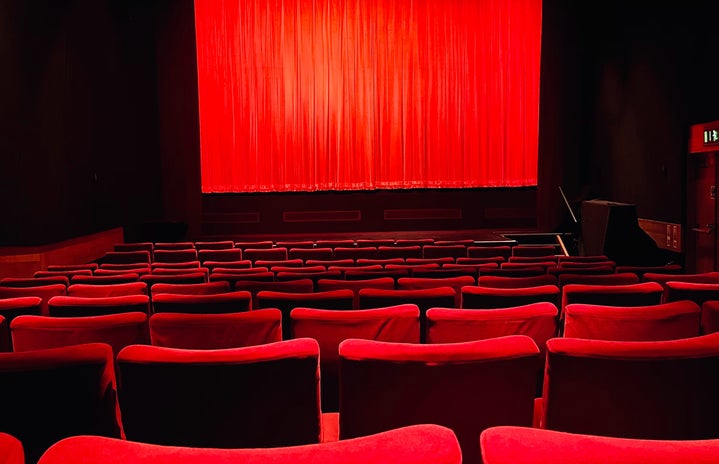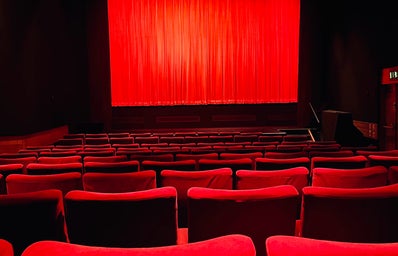*Spoiler Alerts
*Trigger warning for mentions of SA
The opening scene of recently released, Anora, directed by Sean Baker, is sparkly. Set in a high-class strip club, audiences are blinded by pink and purple strobe lights. Our leading lady, Anora, A.K.A. Ani, played by Mikey Madison is seen performing an erotic dance and flirting with the various men in the club. This is all set to the song Greatest Day by British boy band Take That. In an interview with Variety, Baker said that song was a key ingredient to the film especially in the opening sequence “because it’s [Ani’s] greatest day.” Fast forward to the closing scene of the film, the mood is completely different. Ani sits in a beat-up oldsmobile with a snow flurry spinning around outside. She is no longer wearing her signature Russian sable coat and high heels. The tinsel in her long black hair that has glimmered throughout the entire film is hardly noticeable. Earlier in the film we learned that the name Anora means light. Now her light is gone. Ani has experienced a reverse Cinderella story. The movie begins with Ivan “Vanya” Zakharov sweeping her away to his luxurious life of mansions, parties, sex, and drugs. The son of a Russian oligarch, Vanya is “Prince Charming”. However unlike the original Prince Charming who loves Cinderella, Vanya is setting Ani on a path of chaos and loss. Although being described by many, myself included as a screwball comedy, Anora is much more than that.
I saw the film with my sister and cousin. We all felt the profoundness of how the movie portrayed love, lust, loss, and trauma but through the specific lens of a young woman. We have all experienced what Ani has, albeit in a much less extravagant and chaotic way. The movie is able to portray what is happening to Ani through her eyes, but also shows men’s reactions to her. The men desire her and lust after her, or love her and protect her. Vanya lusts after Ani, deceiving her into thinking he loves her. By the end of the film we see just how immature Vanya is–he has no idea how much trauma he has subjected Ani to and he does not care. Completely diminishing their time together, he describes their week together as “fun.” Throughout the film Vanya is not looking at Ani, unless she is dancing for him. Otherwise he is playing video games, or searching for his next good time. The film’s secondary love interest, Igor, one of Vanya’s handlers, truly loves Ani. He is always staring at Ani. He is keenly aware of how she is being used by Vanya just like he has been. In the end it is Igor who holds Ani when she finally cries, letting go of all her anguish.
The film continues to explore how young women move through the world, especially in one of the film’s final scenes. Ani has finally returned to Vanya’s mansion, but without him. Instead it is Igor who has escorted her home. Earlier in the movie, Igor had been tasked to prevent Ani from running away which erupts in a violent clash between the two. The entire time Igor tries not to touch Ani, he does not want to hurt her.
Now, Ani wants to take her anger out on someone, anyone. She tells Igor he was going to sexually assault her. Igor insists he would never do that. This makes Ani very angry and Igor is confused. He asks Ani why would he rape her to which Ani responds: why wouldn’t you? An extremely emotional and intense scene it sheds light on how women operate within the patriarchy, especially women who are sex workers. The film hints at negative experiences Ani has had with men at the club who harassed or touched her inappropriately. Like all of us, our past experiences inform how we engage with people. Ani is not trusting of men. She knows what they are capable of, and is shocked when Igor does not attack her. The film does an excellent job of not glorifying sexual assault in the name of showcasing the violence perpetrated against sex workers. There are many very successful and all-around excellent television shows and movies that can skew exploitative when it comes to sexual violence such as Starz Outlander or HBOs Game of Thrones. In Anora, none of the leading men prey on Ani in that way, which was extremely refreshing, especially when so much media crosses the line when portraying sexual assault.
By now other chronically online individuals have seen the clip of Saorsie Ronan and Paul Mescal’s interaction on the Graham Norton Show. I could not help but connect this moment to the themes in Anora. During the viral conversation Edddie Redmayne is talking about learning self-defense stunts for a new show and learning how to use a phone as a weapon. Mescal then jokes about the idea of using a phone to defend one’s self. Throughout the moment, Ronan can be seen trying to interject, but stops as the men continue to chat and laugh. Eventually Ronan interjects saying “that’s what girls have to think about all the time. Am I right ladies?” The entire interaction went viral. It was a prime example of how women are often operating with a hypervigilance that men simply do not experience.
Mescal’s quips did not seem intentionally harmful, but that is the thing about male privilege or privilege of any kind. If you do not experience things you are often not aware of how harmful they can be. Having certain privileges does not make you an inherently bad person, but it is moments like the one on the Graham Norton show that open the conversation for how to operate as a privileged person. This is the same issue being dealt with in Anora. Class and gender privilege come into play in the film as Vanya is an incredibly spoiled little boy who does not care about how Ani is treated due to her class and gender.
Oscar buzz is already circulating around Anora with critics praising Mikey Madison’s performance and the film as a whole. Does this critical acclaim signal a potential shift in how movies about acutely female experiences are viewed, especially ones about sex workers? Similar films, such as the 2019 film Hustlers, was also about sex workers and received heavy criticism. I was pleasantly surprised by the film. I thought it would be a cheesy commentary on sex work, but it was actually a very interesting take on how to take power back in a line of work that has a definite power imbalance. Pretty Woman is another film about sex work that is a great movie, but because of its Disney backed producing, it was not able to truly explore the intricacies of being an escort. Anora has done what other films about sex work hasn’t. It is not struggling in the box office, doomed to be something appreciated as a cult classic in a few years, nor is it becoming highly successful because it is a PG movie about your favorite neighborhood stripper. It is simply honest and a must watch for all.


